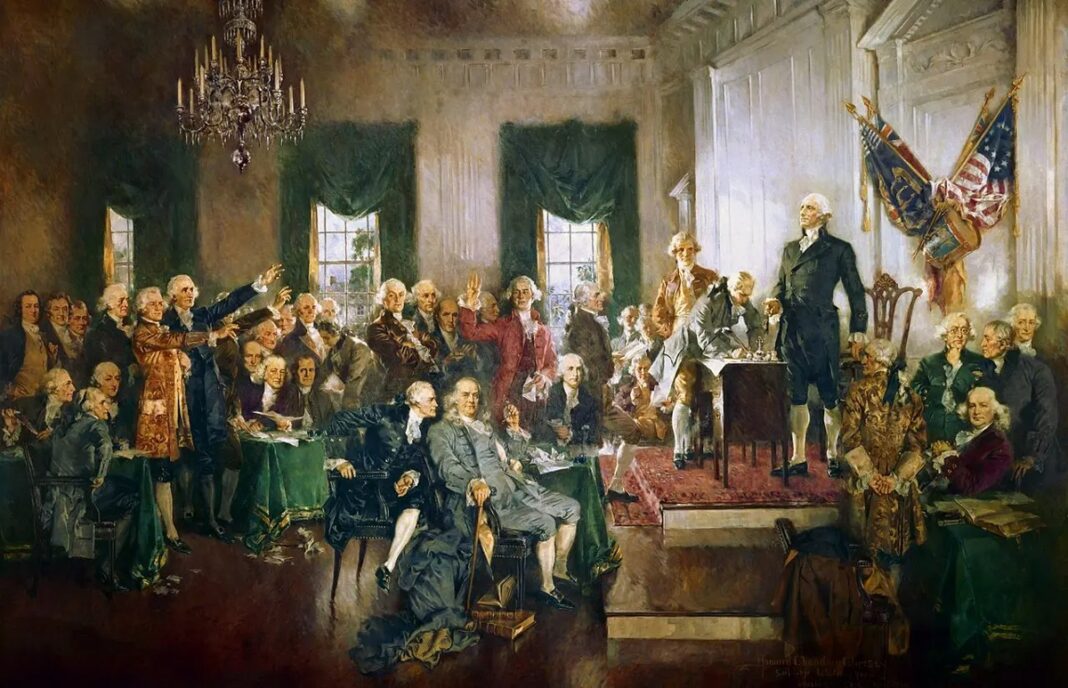As we celebrate Constitution Week, let us remember the saga that occurred only 235 years ago. . .
1787
In 1787, the United States was not united. In fact it seemed as if any minute the country would explode. The trouble was rooted in the poor form of government, the Articles of Confederation, and the states decided to send delegates to meet in Philadelphia for the purpose of mending the Articles.
The two men instrumental in bringing about this meeting (later called the Constitutional Convention) were James Madison and Alexander Hamilton. Madison had been elected to the House of Delegates in 1776, and helped write Virginia’s first constitution. Thirty-six-year-old Madison was chosen to represent Virginia at the meeting. He had to borrow money in order to afford the trip. Alexander Hamilton was born in the West Indies and in 1772 came to America to study law. Though highly talented, he had a lifelong desire for fame. At age 30 Hamilton was chosen to attend the convention representing New York.
The Delegates
Altogether 55 men were chosen from the different states and sent to the Pennsylvania State House for the convention. They were a mix of some of the country’s best thinkers, speakers, and writers. The average age of the men was 41. Jonathan Dayton, the youngest, was 26. Benjamin Franklin of Pennsylvania, though the oldest at 81, was said to “possesses an activity of mind equal to a youth of twenty-five years of age.” Also from Pennsylvania was Gouverneur Morris, an excellent lawyer and financier. Another delegate representing Pennsylvania was Scotland-born James Wilson, a clear speaker who understood both government and people. John Dickinson of Delaware was a lawyer and statesman, but his refusing to sign the Declaration of Independence, made him unpopular. Roger Sherman was a surveyor, merchant, lawyer, and shoemaker from Connecticut. And of course, there was George Washington, the hero from Virginia, who was unanimously chosen president of the convention.
When enough delegates had gathered in the State House, business began. On May 29, Edmund Randolph suggested the Virginia Plan of government, designed by James Madison. It would give the government enough power to enforce the laws it made through three branches of government (legislative, executive, judicial) working through a system of checks and balances. States would be represented in Congress based on population. A number of the delegates were shocked; they had assumed they had come to mend the Articles, nothing more. However, they agreed to scrap the Articles and try a new form of government.
William Paterson of New Jersey presented the Jersey Plan on June 15. It said Congress should have only one chamber, in which the states would vote equally. But the plan still did not give Congress enough power to enforce its laws; the Jersey plan was just a slightly different version of the Articles.
The large states, agreeing with the Virginia Plan, believed size should determine how much say a state would have in Congress. Siding with the Jersey Plan, the small states argued this was unfair: each state should have one vote only. Roger Sherman suggested having the states equal in the Senate and proportional in the House to make both the large and small states happy. After much discussion the idea was approved and called the “Connecticut Compromise.”
As these plans were considered, Alexander Hamilton came up with another. He announced the President and Senators should be chosen for life, and Representatives for three years. Hamilton, a believer in strong forms of government, found his plan did not interest anyone because of its similarity to British rule. And after Madison gave a speech asking for a “Constitution for the ages,” the Virginia Plan was chosen, though there were still some points to be settled. Around this time Hamilton became fed up with the other delegates from his state who were against a strong Federal government, thus making his own vote useless. Discouraged, he returned to New York.
“I wish you were back”
Soon Washington wrote Hamilton, “I almost despair of seeing a favorable issue to the proceedings of our Convention. . . I am sorry you went away. I wish you were back. The crisis is equally important and alarming. . . .” The same day, the two remaining New York delegates left the convention in a huff. Heated arguing had begun over how the President should be elected. While James Wilson fought for a single President, Edmund Randolph wanted three. Over sixty times the delegates voted on this question until it was eventually settled—the United States should have one President only.
Days passed. Tempers rose as quickly as the temperature in the closed-up building. On June 28, Franklin intervened. “I have lived, sir, a long time . . .and the longer I live the more convincing proofs I see of this truth—that God governs in the affairs of men.” Reminding the delegates that only with God’s help could they make a new government, Franklin suggested the convention begin with daily prayers. This would have been done, but the convention had no money for a pastor, who in those days charged for prayers. Yet the men were more hushed after Franklin’s speech.
By August 6 the convention had a rough idea of a constitution. Gouverneur Morris took four days to write the final draft, which had been framed in a remarkably short time—only 85 working days. Thirty-nine men signed the document on September 17, 1787. Hamilton, who had returned, signed as well. Elbridge Gerry, George Mason, and Edmund Randolph refused to sign since it had no Bill of Rights.
James Madison, called the “Father of the Constitution” for his meticulous efforts to form the document into what it was, explained why he signed it: “Because I thought it safe to the liberties of the people and the best that could be obtained from the jarring interests of states, and the miscellaneous opinions of politicians. . . .” Ben Franklin exclaimed that “it astonishes me. . . to find the system approaching so near to perfection as it does!” James Wilson labeled the Constitution “the best form of government . . . offered to the world.”
Legend has it that as Franklin left the State House, a woman rushed up to him asking, “Well, Doctor, what have we got—a republic or a monarchy?” Franklin replied, “A republic, if you can keep it.” The Founding Fathers called the Constitution a “miracle.” And in a way it was.
Bibliography:
Allen, W.B., ed. George Washington: A Collection. Indianapolis: Liberty Fund, 1988.
Allison, Andrew M., Jay A. Parry, and W. Cleon Skousen. The Real George Washington, 3rd ed. National Center for Constitutional Studies, 2010.
Mattern, David B., ed. James Madison’s “Advice to My Country.” University Press of Virginia, 1997.
Skousen, W. Cleon. The Making of America, 3rd ed., revised. National Center for Constitutional Studies, 2007.






